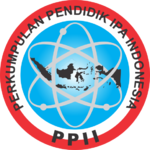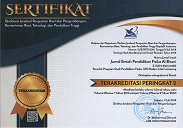Soft Scaffolding Strategy: An Adaptive Post-Pandemic Learning to Facilitate Prospective Physics Teacher’s PCK
Abstract
Keywords
Full Text:
PDFReferences
Allchin, D. (2022). Who speaks for science? Science & Education, 31(6), 1475–1492.
Aulia, M., & Yuliani, H. (2022). POE-based e-module (predict, observe, and explain): Improving students' critical thinking skills on kinetic theory of gases. Online Learning in Educational Research, 2(2), 57-66
Brereton, P., Kitchenham, B., Budgen, D., & Li, Z. (2008). Using a protocol template for case study planning. In 12th International Conference on Evaluation and Assessment in Software Engineering (EASE), 1–8.
Brush, T. A., & Saye, J. W. (2002). A summary of research exploring hard and soft scaffolding for teachers and students using a multimedia-supported learning environment. The Journal of Interactive Online Learning, 1(2), 1–12.
Bryson, N., & Mobolurin, A. (1997). An action learning evaluation procedure for multiple criteria decision making problems. European Journal of Operational Research, 96(2), 379–386.
Cardoso, L., Da Ponte, J. P., & Quaresma, M. (2022). The development of pedagogical content knowledge of prospective primary teachers in a lesson study. International Journal for Lesson & Learning Studies, ahead-of-print.
Carpendale, J. A. (2018). Collaborative CoRe design for year 10 electricity and magnetism: Professional development for enhancing practising science teachers’ PCK.
Carpendale, J., & Hume, A. (2019). Investigating practising science teachers’ pPCK and ePCK development as a result of collaborative CoRe design. Repositioning Pedagogical Content Knowledge in Teachers’ Knowledge for Teaching Science, 225–252.
Castañeda, L., Esteve-Mon, F. M., Adell, J., & Prestridge, S. (2022). International insights about a holistic model of teaching competence for a digital era: The digital teacher framework reviewed. European Journal of Teacher Education, 45(4), 493–512.
Creswell, J. W., & Creswell, J. D. (2017). Research design: Qualitative, quantitative, and mixed methods approaches. Sage publications.
Dirsa, A., BP, S. A., Diananseri, C., & Setiawan, I. (2022). Teacher role as professional educator in school environment. International Journal of Science Education and Cultural Studies, 1(1), 32–41.
Elangovan, N., & Sundaravel, E. (2021). Method of preparing a document for survey instrument validation by experts. MethodsX, 8, 101326.
Galimova, E. G., Zakharishcheva, M. A., Kolomoets, E. N., Chistyakov, A. A., Prokopyev, A. I., Beloborodova, A. V., & Ilaeva, R. A. (2023). A review of research on pedagogical content knowledge in science and mathematics education in the last five years. Eurasia Journal of Mathematics, Science and Technology Education, 19(2), em2223.
Goldie, J. G. S. (2016). Connectivism: A knowledge learning theory for the digital age? Medical Teacher, 38(10), 1064–1069.
Große-Heilmann, R., Riese, J., Burde, J.-P., Schubatzky, T., & Weiler, D. (2022). Fostering pre-service physics teachers’ pedagogical content knowledge regarding digital media. Education Sciences, 12(7), 440.
Hwang, M.-Y., Hong, J.-C., & Hao, Y.-W. (2018). The value of CK, PK, and PCK in professional development programs predicted by the progressive beliefs of elementary school teachers. European Journal of Teacher Education, 41(4), 448–462.
Kulgemeyer, C., Borowski, A., Buschhüter, D., Enkrott, P., Kempin, M., Reinhold, P., Riese, J., Schecker, H., Schröder, J., & Vogelsang, C. (2020). Professional knowledge affects action‐related skills: The development of preservice physics teachers’ explaining skills during a field experience. Journal of Research in Science Teaching, 57(10), 1554–1582.
Lestari, F., Noprisa, N., Desmayanasari, D., Hardianti, D., Efendi, D., & Prasetiyo, A. E. (2021). Auto-play media studio 8 based on blended learning: An effort to optimization of teacher competency. Smart Society : Community Service and Empowerment Journal, 1(2), 61–69. https://www.journal.foundae.com/index.php/smartsoc/article/view/66
Maclellan, E. (2004). Initial knowledge states about assessment: Novice teachers’ conceptualisations. Teaching and Teacher Education, 20(5), 523–535.
Mahajan, N., & Jadhav, V. (2019). Effect of planned teaching program on knowledge regarding dengue fever among selected junior college students. Science, 31, 62–0.
Malhotra, G., & Masih, A. (2022). PCK for developing understanding of NOS: A review of past studies. Journal of Scientific Temper (JST), 10(4).
Mavhunga, E., Rollnick, M., Ibrahim, B., & Qhobela, M. (2016). Student teachers’ competence to transfer strategies for developing PCK for electric circuits to another physical sciences topic. African Journal of Research in Mathematics, Science and Technology Education, 20(3), 299–313.
McDowell, M. (2019). Developing expert learners: A roadmap for growing confident and competent students. Corwin Press.
Nurulsari, N., & Suyatna, A. (2017). Development of soft scaffolding strategy to improve student’s creative thinking ability in physics. 909(1), 012053.
Park, S., Suh, J., & Seo, K. (2018). Development and validation of measures of secondary science teachers’ PCK for teaching photosynthesis. Research in Science Education, 48, 549–573.
Podworny, S., Frischemeier, D., & Biehler, R. (2023). Civic statistics for prospective teachers: Developing content and pedagogical content knowledge through project work. In Statistics for empowerment and social engagement: Teaching civic statistics to develop informed citizens (pp. 369–393). Springer.
Rahman, B., Abdurrahman, A., Kadaryanto, B., & Rusminto, N. E. (2015). Teacher-based scaffolding as a teacher professional development program in Indonesia. Australian Journal of Teacher Education, 40(11), 4.
Richardson, G. M., Byrne, L. L., & Liang, L. L. (2018). Making learning visible: Developing preservice teachers’ pedagogical content knowledge and teaching efficacy beliefs in environmental education. Applied Environmental Education & Communication, 17(1), 41–56.
Rochintaniawati, D., Widodo, A., Riandi, R., & Herlina, L. (2018). Pedagogical content knowledge depelopment of science prospective teachers in professional practice program. Unnes Science Education Journal, 7(2).
Rollnick, M. (2017). Learning about semi conductors for teaching—The role played by content knowledge in pedagogical content knowledge (PCK) development. Research in Science Education, 47, 833–868.
Roni, S. M., Merga, M. K., & Morris, J. E. (2020). Conducting quantitative research in education. Springer.
Schiering, D., Sorge, S., Keller, M. M., & Neumann, K. (2023). A proficiency model for pre‐service physics teachers’ pedagogical content knowledge (PCK)—What constitutes high‐level PCK? Journal of Research in Science Teaching.
Schons, C., Obersteiner, A., Reinhold, F., Fischer, F., & Reiss, K. (2022). Developing a simulation to foster prospective mathematics teachers’ diagnostic competencies: The effects of scaffolding. Journal Für Mathematik-Didaktik, 1–24.
Segal, R., & Stupel, M. (2023). Pre-service mathematics teachers investigating the attributes of inscribed circles by technological and theoretical scaffolding. International Electronic Journal of Mathematics Education, 18(1), em0726.
Shing, C. L., Saat, R. M., & Loke, S. H. (2018). The knowledge of teaching –pedagogical content knowledge (PCK). MOJES: Malaysian Online Journal of Educational Sciences, 3(3), 40–55.
Soebari, T., & Aldridge, J. M. (2016). Investigating the differential effectiveness of a teacher professional development programme for rural and urban classrooms in Indonesia. Teacher Development, 20(5), 701–722.
Sorge, S., Kröger, J., Petersen, S., & Neumann, K. (2019). Structure and development of pre-service physics teachers’ professional knowledge. International Journal of Science Education, 41(7), 862–889.
Subramaniam, K. (2022). Prospective teachers’ pedagogical content knowledge development in an elementary science methods course. Journal of Science Teacher Education, 33(4), 345–367.
Sutamrin, S., Rosidah, R., & Zaki, A. (2022). The pedagogical content knowledge (PCK) of prospective teachers. EduLine: Journal of Education and Learning Innovation, 2(4), 399–405.
Wang, L., & Oliver, J. S. (2022). Exploration of secondary science prospective teachers’ development of PCK during a school-based practicum. The Hoosier Science Teacher, 45(2), 27–33.
Wiener, G. J., Schmeling, S. M., & Hopf, M. (2018). The technique of probing acceptance as a tool for teachers’ professional development: A PCK study. Journal of Research in Science Teaching, 55(6), 849–875.
Wijngaards-de Meij, L., & Merx, S. (2018). Improving curriculum alignment and achieving learning goals by making the curriculum visible. International Journal for Academic Development, 23(3), 219–231.
Wilson, C. D., Borowski, A., & van Driel, J. (2019). Perspectives on the future of PCK research in science education and beyond. Repositioning Pedagogical Content Knowledge in Teachers’ Knowledge for Teaching Science, 291–302.
Wongsopawiro, D. S., Zwart, R. C., & van Driel, J. H. (2017). Identifying pathways of teachers’ PCK development. Teachers and Teaching, 23(2), 191–210.
DOI: http://dx.doi.org/10.24042/jipfalbiruni.v12i1.16071
Refbacks
- There are currently no refbacks.

Jurnal ilmiah pendidikan fisika Al-Biruni is licensed under a Creative Commons Attribution-ShareAlike 4.0 International License.
![]()








